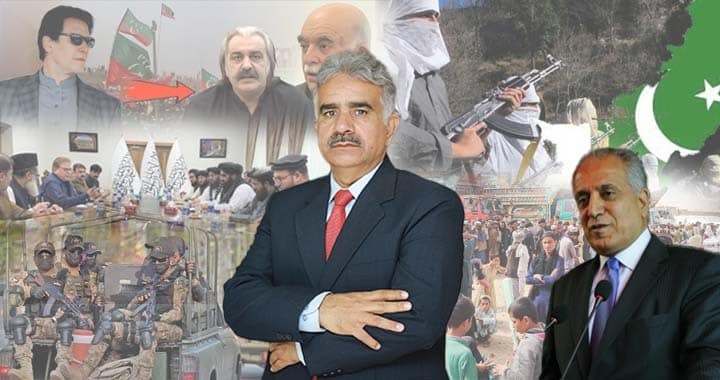The recent escalation in terrorist activities in the border regions of Balochistan and Khyber Pakhtunkhwa once again forces us to confront a dangerous truth. For too long, political discord between the federal government and provincial authorities has enabled the resurgence of violence. While we often find ourselves entangled in debates over sovereignty, policy, and procedure, the ground reality is clear: terrorist groups like the TTP, BLA, and IS-KP do not recognize our constitution, our laws, or the very legitimacy of our state.
Some politicians continue to advocate for negotiation, as if the lessons of history have not already been written in blood. The previous administration, including the military leadership under General Bajwa and General Faiz, alongside former Prime Minister Imran Khan, pursued a policy of engagement. They tried to bring militants back into the fold under the premise of reconciliation. The idea was noble in theory, but it collapsed under the weight of extremist intransigence. The militants did not surrender, they did not accept the state’s legitimacy, and they certainly did not lay down their arms.
Now, a renewed effort appears to be taking shape, with figures such as Mehmood Khan Achakzai allegedly tasked by political actors to once again engage with the Taliban. But who gave him this mandate? Does he possess any legitimacy to speak on behalf of the state of Pakistan? And more importantly, why are individual politicians undermining the state’s policy and playing a parallel diplomatic game?
Pakistan has made its position unequivocally clear. After the Bannu attack, which claimed the lives of six of our soldiers, a decisive message was sent to Kabul: choose Pakistan or choose terrorism. This is not a threat. It is a strategic crossroads. The days of ambiguity are over.
Pakistan is not operating in a vacuum. China, our strategic partner, has also voiced a clear policy of zero tolerance for terrorism. The success of regional initiatives like CPEC 2.0 depends on stability. Development and terrorism cannot coexist. Kabul must make a choice. If it wants regional integration, railway infrastructure, and economic prosperity, it must eliminate safe havens for terror groups. And if it does not act, Pakistan has every right to defend itself.
Let us not forget that the Afghan Taliban are either unwilling or incapable of reining in these terrorist elements. While on one hand they claim sovereignty, on the other they allow outlawed groups to operate with impunity. When presented with actionable intelligence, including coordinates and positions of TTP hideouts, their response has been silence, evasion, or worse, denial.
There is a growing frustration within Pakistan. We have lost over 80,000 lives to terrorism. We carry the burden of decades of war. Yet, when we act in self-defence, we are accused of violating sovereignty. What about our sovereignty? What about our right to protect our citizens, our soldiers, our borders?
International actors like Zalmay Khalilzad have resurfaced with familiar prescriptions: talk, negotiate, reconcile. But whom should we negotiate with? Groups that are banned by the UN and the United States themselves? Groups that kill civilians, ambush soldiers, and openly reject democratic systems?
Khalilzad is no longer a US government official. His advice carries no official weight. Pakistan’s foreign policy will not and should not be shaped by the whims of former diplomats, think tanks, or foreign pressure groups. We are facing a war for the soul of our state, and our policy must be rooted in clarity and conviction.
It is not just about Pakistan. The region, and indeed the world, should be concerned. The flames of terrorism, if left unchecked, will not stop at our borders. Central Asian republics, Iran, Russia, and eventually Europe will feel the heat. Afghanistan is already burning from within, and the Taliban regime, far from consolidating governance, is cracking under internal power struggles.
Within the ranks of the Taliban, figures like Sirajuddin Haqqani and Mullah Yaqoob represent divergent ideologies and conflicting loyalties. These tensions are not simply about policy, but about power, resources, and influence. Haqqani, considered by many to be pro-Pakistan, is being sidelined. Groups loyal to Gulbuddin Hekmatyar or others have their own agendas. Meanwhile, markets in Afghanistan are closing, and Taliban fighters are reportedly extorting local merchants under the guise of protection. What kind of Islamic system is this, where “gifts” are demanded from ordinary people in the name of governance?
At the same time, the Taliban maintain relations with powers they once deemed enemies of Islam. If they accept aid from America and India, and then share it with groups like the TTP, how do they reconcile this with their so-called Sharia? The hypocrisy is glaring, and it discredits their ideological narrative.
Let us also be clear: 10,000 militants cannot overpower a nation of 240 million. They cannot defeat a professional military force of 700,000. They cannot impose their twisted version of an Islamic state on a nuclear power. The agenda behind this violence is not victory, but destabilisation.
Pakistan has stood as the frontline state in the global war on terror for over two decades. We have bled for regional peace. Now, we must not falter. The Afghan Taliban must dismantle terrorist sanctuaries, or face international and regional isolation. Our policy is no longer one of appeasement. It is of action.
In conclusion, the Afghan Taliban must abandon the anti-Pakistan narrative, stop scapegoating the Pakistani army and intelligence services, and fulfill their own obligations. If they cannot, Pakistan must reserve the right to protect its people. And to the international community, the message is simple: destabilising Pakistan is not just impossible, it is dangerous for all.
This is not just Pakistan’s fight anymore. It is a fight for regional stability, and for the future of an entire generation.





